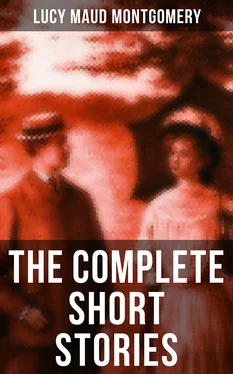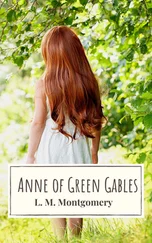“Look here, Mollie,” said Eben awkwardly at last, “are you going to stand up for prayers tonight?”
“I — I can’t as long as father acts this way,” answered Mollie, in a choked voice. “I — I want to, Eb, and Mirry and Bob want me to, but I can’t. I do hope that the evangelist won’t come and talk to me special tonight. I always feels as if I was being pulled two different ways, when he does.”
Back in the kitchen at home Mrs. Bell was waiting for her husband to bring the horse to the door. She was a slight, dark-eyed little woman, with thin, vivid-red cheeks. From out of the swathings in which she had wrapped her bonnet, her face gleamed sad and troubled. Now and then she sighed heavily.
The cat came to her from under the stove, languidly stretching himself, and yawning until all the red cavern of his mouth and throat was revealed. At the moment he had an uncanny resemblance to Elder Joseph Blewett of White Sands — Roaring Joe, the irreverent boys called him — when he grew excited and shouted. Mrs. Bell saw it — and then reproached herself for the sacrilege.
“But it’s no wonder I’ve wicked thoughts,” she said, wearily. “I’m that worried I ain’t rightly myself. If he would only tell me what the trouble is, maybe I could help him. At any rate, I’d KNOW. It hurts me so to see him going about, day after day, with his head hanging and that look on his face, as if he had something fearful on his conscience — him that never harmed a living soul. And then the way he groans and mutters in his sleep! He has always lived a just, upright life. He hasn’t no right to go on like this, disgracing his family.”
Mrs. Bell’s angry sob was cut short by the sleigh at the door. Her husband poked in his busy, iron-gray head and said, “Now, mother.” He helped her into the sleigh, tucked the rugs warmly around her, and put a hot brick at her feet. His solicitude hurt her. It was all for her material comfort. It did not matter to him what mental agony she might suffer over his strange attitude. For the first time in their married life Mary Bell felt resentment against her husband.
They drove along in silence, past the snow-powdered hedges of spruce, and under the arches of the forest roadways. They were late, and a great stillness was over all the land. David Bell never spoke. All his usual cheerful talkativeness had disappeared since the revival meetings had begun in Avonlea. From the first he had gone about as a man over whom some strange doom is impending, seemingly oblivious to all that might be said or thought of him in his own family or in the church. Mary Bell thought she would go out of her mind if her husband continued to act in this way. Her reflections were bitter and rebellious as they sped along through the glittering night of the winter’s prime.
“I don’t get one bit of good out of the meetings,” she thought resentfully. “There ain’t any peace or joy for me, not even in testifying myself, when David sits there like a stick or stone. If he’d been opposed to the revivalist coming here, like old Uncle Jerry, or if he didn’t believe in public testimony, I wouldn’t mind. I’d understand. But, as it is, I feel dreadful humiliated.”
Revival meetings had never been held in Avonlea before. “Uncle” Jerry MacPherson, who was the supreme local authority in church matters, taking precedence of even the minister, had been uncompromisingly opposed to them. He was a stern, deeply religious Scotchman, with a horror of the emotional form of religion. As long as Uncle Jerry’s spare, ascetic form and deeply-graved square-jawed face filled his accustomed corner by the northwest window of Avonlea church no revivalist might venture therein, although the majority of the congregation, including the minister, would have welcomed one warmly.
But now Uncle Jerry was sleeping peacefully under the tangled grasses and white snows of the burying ground, and, if dead people ever do turn in their graves, Uncle Jerry might well have turned in his when the revivalist came to Avonlea church, and there followed the emotional services, public testimonies, and religious excitement which the old man’s sturdy soul had always abhorred.
Avonlea was a good field for an evangelist. The Rev. Geoffrey Mountain, who came to assist the Avonlea minister in revivifying the dry bones thereof, knew this and reveled in the knowledge. It was not often that such a virgin parish could be found nowadays, with scores of impressionable, unspoiled souls on which fervid oratory could play skillfully, as a master on a mighty organ, until every note in them thrilled to life and utterance. The Rev. Geoffrey Mountain was a good man; of the earth, earthy, to be sure, but with an unquestionable sincerity of belief and purpose which went far to counterbalance the sensationalism of some of his methods.
He was large and handsome, with a marvelously sweet and winning voice — a voice that could melt into irresistible tenderness, or swell into sonorous appeal and condemnation, or ring like a trumpet calling to battle.
His frequent grammatical errors, and lapses into vulgarity, counted for nothing against its charm, and the most commonplace words in the world would have borrowed much of the power of real oratory from its magic. He knew its value and used it effectively — perhaps even ostentatiously.
Geoffrey Mountain’s religion and methods, like the man himself, were showy, but, of their kind, sincere, and, though the good he accomplished might not be unmixed, it was a quantity to be reckoned with.
So the Rev. Geoffrey Mountain came to Avonlea, conquering and to conquer. Night after night the church was crowded with eager listeners, who hung breathlessly on his words and wept and thrilled and exulted as he willed. Into many young souls his appeals and warnings burned their way, and each night they rose for prayer in response to his invitation. Older Christians, too, took on a new lease of intensity, and even the unregenerate and the scoffers found a certain fascination in the meetings. Threading through it all, for old and young, converted and unconverted, was an unacknowledged feeling for religious dissipation. Avonlea was a quiet place, — and the revival meetings were lively.
When David and Mary Bell reached the church the services had begun, and they heard the refrain of a hallelujah hymn as they were crossing Harmon Andrews’ field. David Bell left his wife at the platform and drove to the horseshed.
Mrs. Bell unwound the scarf from her bonnet and shook the frost crystals from it. In the porch Flora Jane Fletcher and her sister, Mrs. Harmon Andrews, were talking in low whispers. Presently Flora Jane put out her lank, cashmere-gloved hand and plucked Mrs. Bell’s shawl.
“Mary, is the elder going to testify tonight?” she asked, in a shrill whisper.
Mrs. Bell winced. She would have given much to be able to answer
“Yes,” but she had to say stiffly,
“I don’t know.”
Flora Jane lifted her chin.
“Well, Mrs. Bell, I only asked because every one thinks it is strange he doesn’t — and an elder, of all people. It looks as if he didn’t think himself a Christian, you know. Of course, we all know better, but it LOOKS that way. If I was you, I’d tell him folks was talking about it. Mr. Bentley says it is hindering the full success of the meetings.”
Mrs. Bell turned on her tormentor in swift anger. She might resent her husband’s strange behavior herself, but nobody else should dare to criticize him to her.
“I don’t think you need to worry yourself about the elder, Flora Jane,” she said bitingly. “Maybe ‘tisn’t the best Christians that do the most talking about it always. I guess, as far as living up to his profession goes, the elder will compare pretty favorably with Levi Boulter, who gets up and testifies every night, and cheats the very eye-teeth out of people in the daytime.”
Читать дальше












